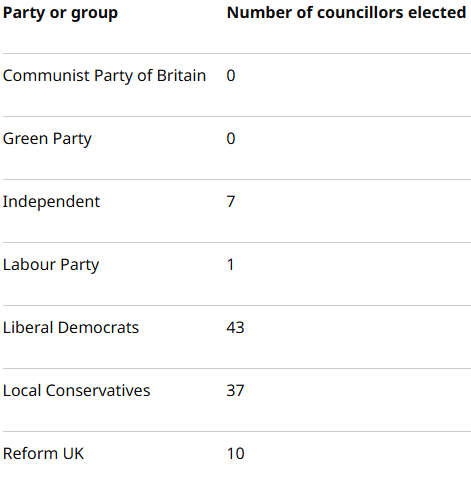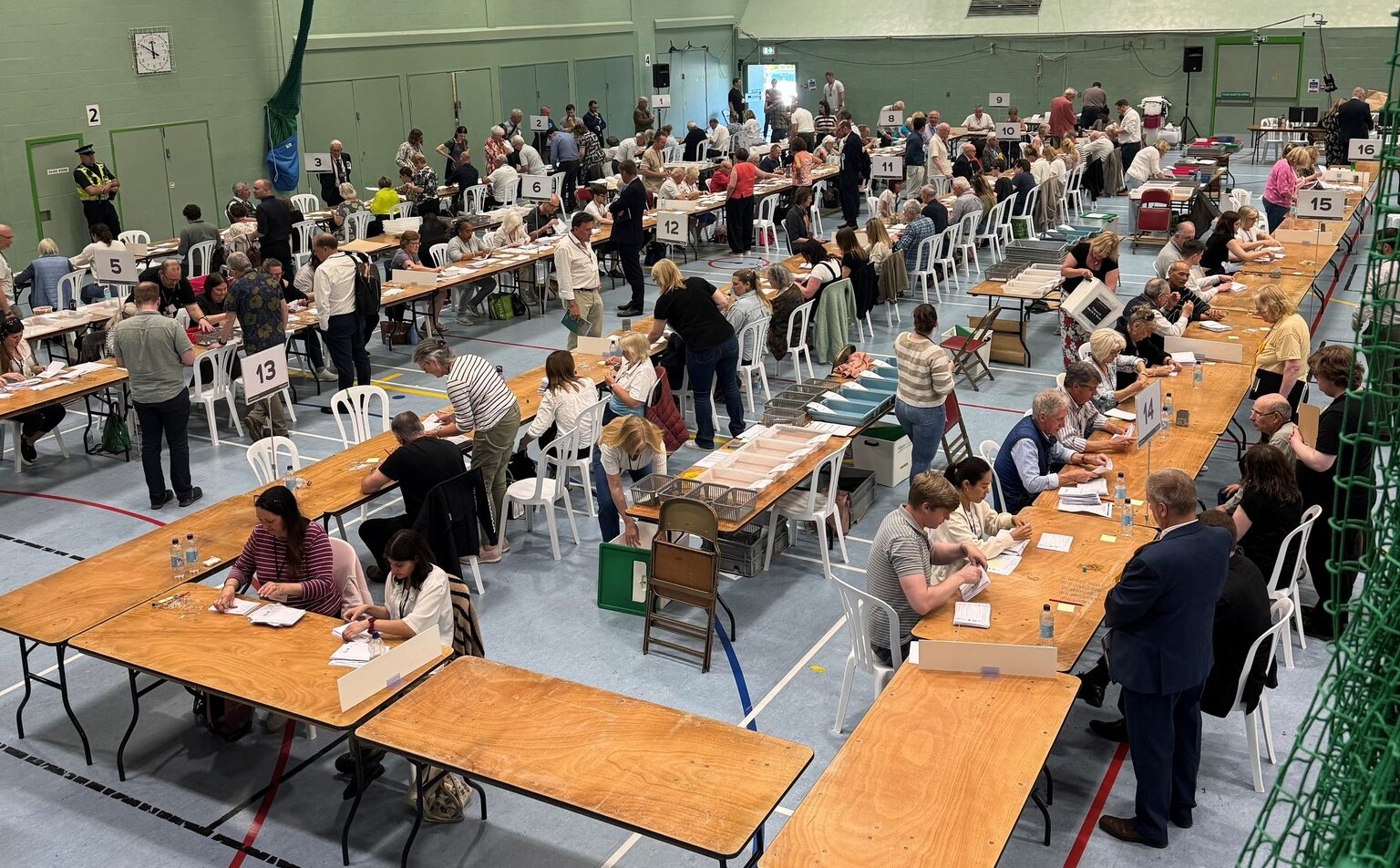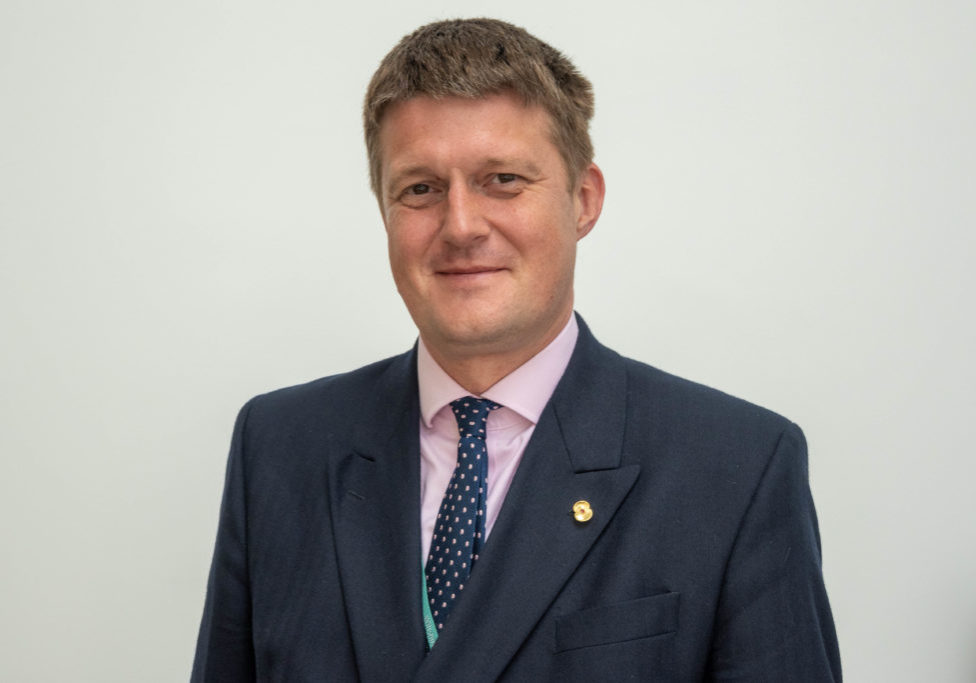IT was a dramatic end to the election in Wiltshire last week as the Liberal Democrats put an end to 25 years of Conservative Party rule.
Votes went to the polls last Thursday (May 1) and results trickled in the following afternoon, with just 36.19% of people turning out to vote.
While the result itself was clear, what is not clear is how the council will work moving forward.
The Liberal Democrats are now the largest party with 43 councillors, with the Tories in second place with 37.
Despite this historic victory, the Lib Dems do not have overall control of Wiltshire Council as they needed to secure half of the 98 seats that were up for grabs (49).
The makeup of Wiltshire Council is now 43 Liberal Democrats, 37 Conservatives, 7 Independents, 1 Labour, and 10 Reform UK.

Returning officer for Wiltshire, Lucy Townsend said elected councillors will meet to “discuss how the council will operate” moving forward.”
The next full council meeting is taking place on May 20, where the new leader and cabinet members will be formally elected.
Lack of overall control leaves room for coalitions
No overall control at Wiltshire Council means the Lib Dems could operate with a minority administration where they would govern despite not having more than half of all councillors.
According to the chief executive of the Local Government Information Unit, Jonathan Carr-West, no overall control does not mean that no decisions are being made.
“In most cases one party will be able to form a cabinet, either with support from other parties or because the other parties do not agree on enough to effectively oppose them,” he said.

“That might sound unstable but in reality no overall control councils have a pretty good track record of getting business done effectively.”
Before the elections took place across the country, Conservative leader Kemi Badenoch spoke to Sky’s Sunday Morning with Trevor Phillips, where she did not rule out forming coalitions at a local level with Reform – but did rule out a pact with Reform at a national level.
No overall control has also opened the door for the potential for coalitions, where parties could work together to govern.
In Wiltshire, this could see the Lib Dems join forces with Independents and even Labour as they look to secure the overall majority.
Alternatively, the Conservatives could join with the Independents and Reform UK councillors.
Fall of the Conservative Party
The Conservative Party saw considerable losses this year, with the number of elected councillors falling from 61 in the 2021 election to just 37 in 2025.
Former Wiltshire Council leader, Conservative Richard Clewer, told the BBC that the result was “really frustrating”, but that there was some “cold comfort” that the Wiltshire Conservatives did better than most other Conservative councils.

Richard Clewer has been the leader of the Conservatives in Wiltshire since 2021 Picture: Wiltshire Council
“But that really isn’t saying anything at the scale of what’s happened,” he added.
“It creates some very significant questions Wiltshire needs to answer over the next few days.”
Ed Davey comes to Salisbury to celebrate result
Lib Dem leader Sir Ed Davey joined councillors at Harnham Recreation Ground on Saturday (May 3) for a spot of cricket and to celebrate the result.

Ed Davey celebrating the result Picture: Cllr Al Bayliss
His party saw its numbers of councillors rise from 27 in 2021 to 43 in 2025.
Speaking to the BBC, Davey said his party is gaining from people turning away from the Conservatives.
Sir Ed said: “We’ve had historic results… here in Wiltshire we have never been the largest party, so across middle England it is the Liberal Democrats gaining from the Conservatives.”
Just ONE Labour councillor elected
Just one Labour councillor was elected this year, Ricky Rogers, who has represented the Fisherton and Bemerton Village ward for 35 years and counting.
While their drop-off in elected councillors is not as severe as for the Conservatives, the Labour Party only managed to secure three councillors in the 2021 election.
Rise of Reform
Reform UK saw some serious gains in Wiltshire, with the party now boasting 10 new councillors for the first time.
This means that Reform are currently the third largest party at Wiltshire Council.
This was a similar picture across the country, as the party took control of 10 local councils, won two mayoral races and added a fifth MP following the by-election in Runcorn and Helsby.









Leave a Reply